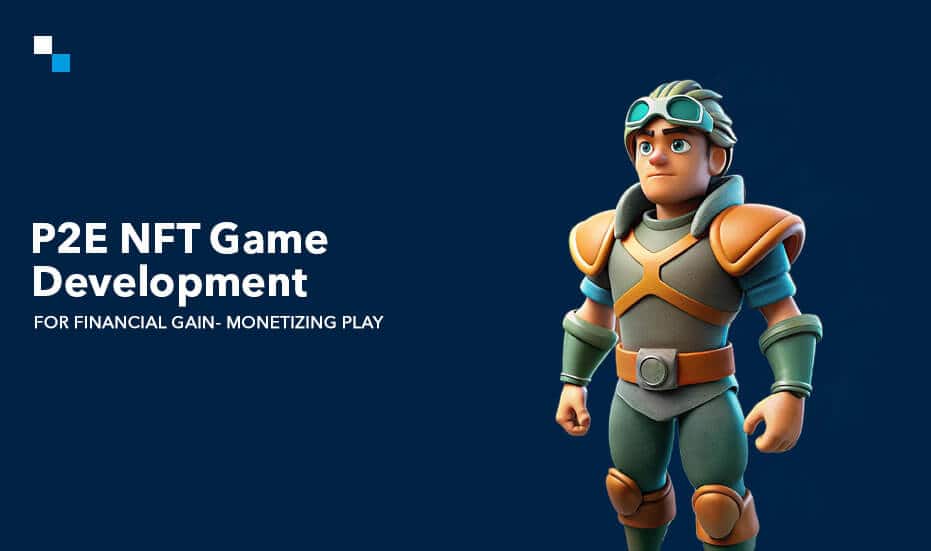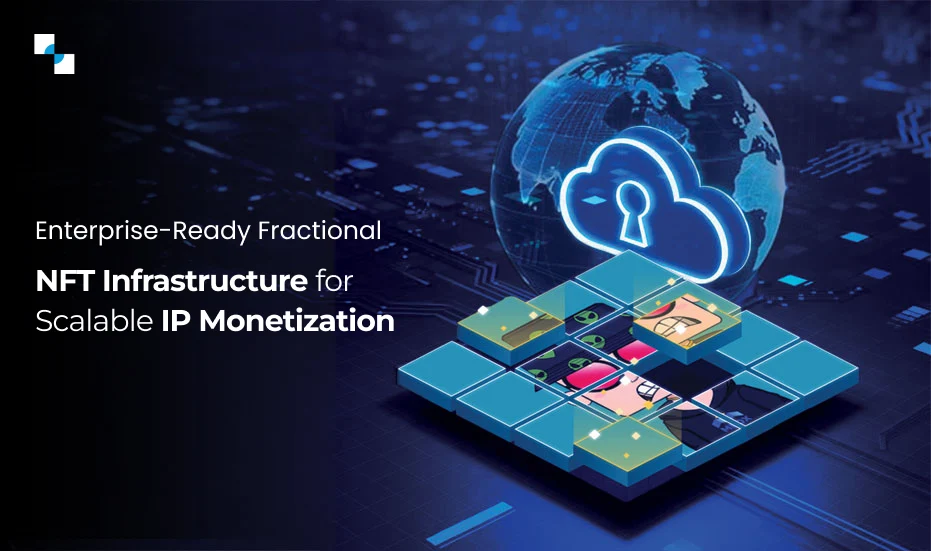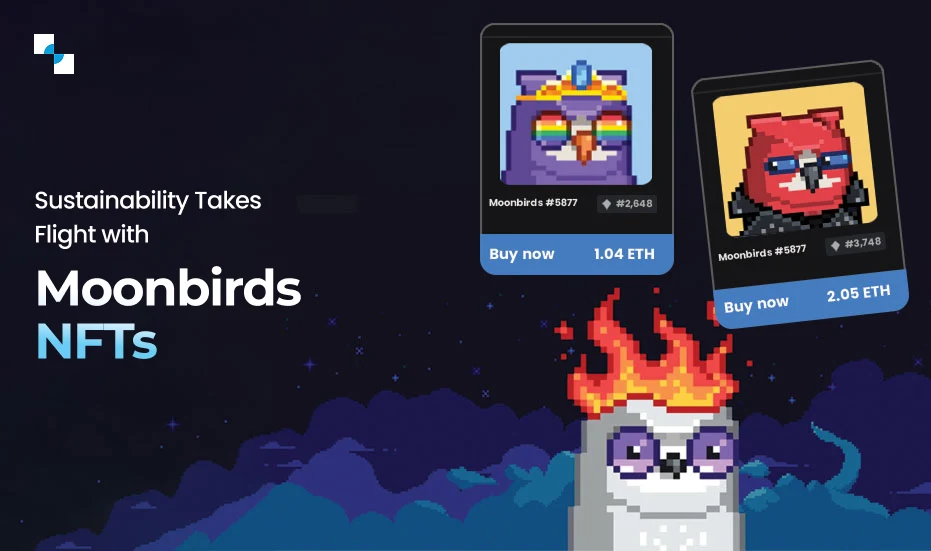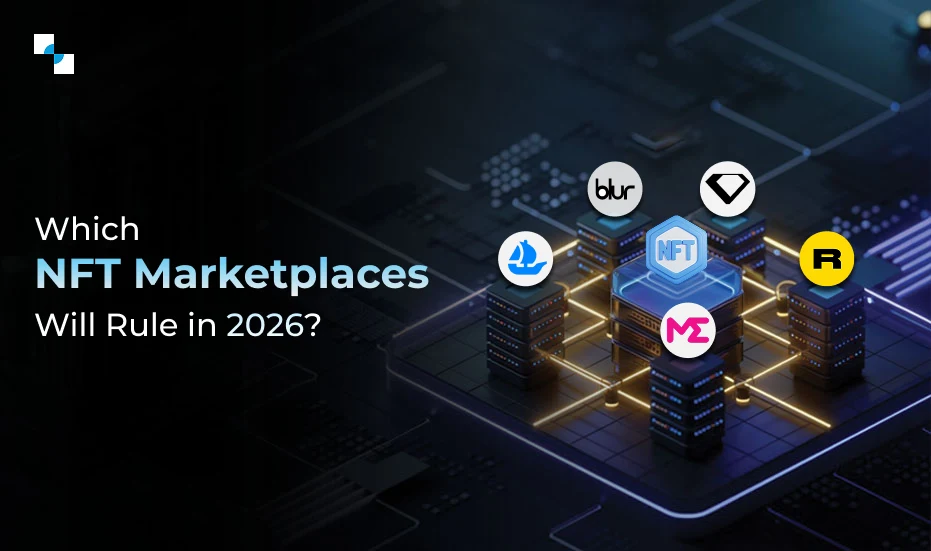In recent years, the world of gaming has experienced a revolutionary change with the rise of Play to Earn games powered by NFTs. These games have opened up a whole new world of opportunities for gamers to earn real money by playing their favorite games. Today, developers like to create P2E game that can allure players by providing money-earning opportunities. However, before we discuss more about P2E NFT game development, let’s understand how these games work, and what are the different types of P2E crypto games that are becoming popular these days.

The symbiosis of NFTs with Play to Earn game development allows players to enjoy true ownership of in-game assets and enables players to monetize their gaming experience. With NFTs, players can buy, sell, and trade virtual assets with real-world value, and ern while they play.
How Do Play-to-Earn Games Work?
As said before, P2E NFT games are based on the idea of providing true digital ownership to the players. Unlike traditional games in which in-game assets and characters have no real-world value, NFTs enable players to win tradable digital items with a clear record of ownership on the blockchain ledger. These assets may range from rare collectibles, powerful weapons, or even virtual real estate, each with its own scarcity and value determined by market forces.
By integrating NFTs into their game mechanics, P2E NFT game development specialists create vibrant in-game economies where players can buy, sell, trade, and potentially earn real money from their virtual assets. It will enable players to monetize their gaming skills and time investment by earning valuable NFTs or cryptocurrency tokens through gameplay, which can then be traded or sold on decentralized marketplaces.
How Play to Earn Game Development Facilitates Players and Allows Them to Earn Money?
Play to Earn game development facilitates players to earn real money through various mechanisms and features integrated into the gameplay. Here are some ways P2E games allow players to earn money:
- In-game asset ownership and trading
P2E games are powered by unique in-game assets such as characters, weapons, skins, or virtual real estate, and all these are in the form of NFTs. Players can earn these NFTs through gameplay and then trade or sell them on decentralized marketplaces, earning real money.
- Cryptocurrency rewards
Many P2E games reward players with cryptocurrency tokens or coins for completing quests, winning battles, or contributing resources to the game’s ecosystem. These cryptocurrencies can be sold on exchanges or used within the game’s economy. - Staking and yield farming
Some developers incorporate DeFi elements when they create P2E game, which allow players to earn passive income by staking their in-game assets or cryptocurrencies in liquidity pools or yield farming mechanisms. - Player-owned economies
P2E NFT game development includes the insertion of player-driven economies, so players can create, trade, and monetize various in-game assets or services. This can include crafting and selling rare items, renting out virtual real estate, or providing gaming-related services to other players. - Tournament and competitive play
Many P2E games feature competitive modes or tournaments where skilled players can earn prizes for participating and performing well. They win cryptocurrencies or valuable NFTs. - Content creation and monetization
Some P2E games allow players to create and monetize their own in-game content, such as levels, quests, or game modes, by selling or licensing their creations to other players or Play to Earn game development firm.
- Resource mining or farming
Certain P2E games incentivize players to contribute computational resources or engage in activities like mining or farming virtual resources, rewarding them with cryptocurrency or in-game assets proportional to their contributions. - Referral and affiliate programs
P2E games often have referral and affiliate programs where players can earn rewards or commissions by introducing new players to the game or promoting it through various channels.

Types of Play-to-Earn Crypto Games
Ready to create P2E game? Decide what kind of game you intend to develop. Here are some of them:
- Collectible NFT Games: These games revolve around collecting and trading unique NFT assets, such as digital art, virtual pets, or trading cards. Examples- NBA Top Shot and CryptoKitties.
- Metaverse Games: These games offer immersive virtual worlds where players can own and monetize virtual real estate, avatars, and other digital assets. Examples – Decentraland and The Sandbox.
- Battle Games: These games feature competitive gameplay where players can earn rewards by winning battles or completing challenges. Examples- Axie Infinity and Thetan Arena.
- Mining Games: These games incentivize players to contribute computational resources to the blockchain network, earning cryptocurrency rewards in return. Examples – Cyber Mines and MIR4.
- Casino Games: These games incorporate NFTs and cryptocurrency into traditional casino-style games, allowing players to earn real money through gameplay. Examples- Decentral Games and CryptoGames.
- MMORPGs (Massively Multiplayer Online Role-Playing Games): These games allow players to explore vast virtual worlds, complete quests, and interact with other players while earning rewards in the form of NFTs or cryptocurrencies. Examples- Final Fantasy 14 and World of Warcraft
Things To Be Kept in Mind During Play to Earn Game Development
When you create P2E game, you must consider these important things to ensure success:
- Game Design and Mechanics
The core gameplay experience should be engaging, fun, and rewarding, even without the earning potential. The P2E mechanics should complement the gameplay rather than overshadow it. Balance is key to avoiding the game becoming solely focused on financial gain. - In-Game Economy
Establishing a well-designed and balanced in-game economy is crucial. P2E NFT game development professionals must carefully manage token supply, distribution, and reward mechanisms to prevent inflation or deflation. Economic models should be thoroughly tested and adjusted as needed. - Token Utility and Tokenomics
The cryptocurrencies or tokens used in the game should have clear utility within the ecosystem. Tokenomics, including token distribution, staking rewards, and burn mechanisms, should be designed to incentivize desired player behaviors and maintain token value. - Scalability and Performance
As P2E games gain popularity, their infrastructure must be able to handle the increased load and transaction volume. Play to Earn game development specialists should prioritize scalability, efficient blockchain integration, and optimized game performance. - Security and Fraud Prevention
Implementing robust security measures is essential to protect player assets and prevent fraud, hacking, or exploits. When you create P2E game, your focus should be on employing industry-standard security practices, conducting regular audits, and having contingency plans in place. - Accessibility and User Experience
While blockchain and cryptocurrency concepts may be complex, the user experience should be intuitive and user-friendly. Onboarding processes, wallet integrations, and in-game marketplaces should be seamless for both experienced and new users. - Regulatory Compliance
P2E games may be subject to various regulations depending on the jurisdictions they operate in. One needs to stay up-to-date with relevant laws and regulations regarding cryptocurrencies, gaming, and digital assets to make the P2E NFT game development project successful. - Environmental Sustainability
The energy consumption of blockchain technology and mining activities should be addressed. Developers should explore and implement sustainable solutions, such as energy-efficient consensus mechanisms or the use of renewable energy sources. - Community Building and Engagement
Building and nurturing a strong community is essential for the long-term success of P2E games. You should prioritize transparent communication, gather feedback, and foster a sense of ownership and investment among players. - Ethical and Fair Practices
Play to Earn game development should be done with ethical and fair practices in mind, ensuring equal opportunities for all players, protecting against exploitation or predatory mechanics, and promoting responsible gaming practices. - Future-Proofing and Adaptability
The blockchain and gaming industries are rapidly evolving. You must have the the ability to adapt and integrate new technologies, features, or trends, to craft an engaging P2E game.
Final Thoughts
The integration of NFTs and P2E NFT game development presents an exciting opportunity to players to earn real money while engaging in their favorite gaming experiences. P2E NFT games introduce a new level of engagement, incentivization, and financial empowerment. If you want to make the best of it, you must focus on building an attractive game design and balanced economies, besides considering sustainability and accessibility. Let Antier do it for you. Ours is a reputed Play to Earn game development company with years of experience in crafting captivating games that generate real financial gains.
Ready to leverage our expertise? Contact now!







